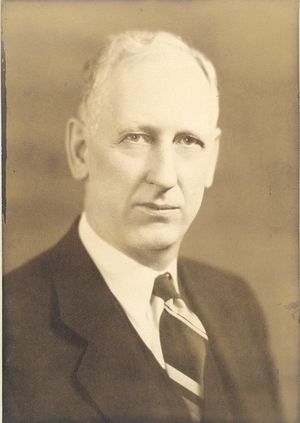Hubert Turner: Difference between revisions
No edit summary |
No edit summary |
||
| Line 1: | Line 1: | ||
== Hubert Turner: Biography == | == Hubert Turner: Biography == | ||
[[Image:2189 - turner.jpg|thumb|left]] | <p>[[Image:2189 - turner.jpg|thumb|left]] </p> | ||
<p>'''Would you like to help us? Use the edit tab to contribute to this article.''' </p> | <p>'''Would you like to help us? Use the edit tab to contribute to this article.''' </p> | ||
<p>Born: </p> | <p>Born: July 20, 1882</p> | ||
<p>Died: </p> | <p>Died: </p> | ||
Hubert Michael Turner was born on July 20, 1882, at Hillsboro, Illinois. After being graduated in electrical engineering from the University of Illinois in 1910, he remained as an assistant instructor for two years while taking graduate work in mathematics, physics, and electrical engineering. He received his Master's degree in 1915. From 1912 to 1918 he instructed at the University of Minnesota and organized courses in transient phenomena and radio. During the war he was placed in charge of technical instruction of the Signal Corps unit of enlisted men at the University of Minnesota. In October, 1918, he became assistant professor of radio with the Signal Corps School for Officer Candidates at Yale. | |||
In 1919 he was appointed assistant professor of electrical engineering at Yale, and in 1926, associate professor. His entire time is devoted to the graduate course | |||
in communication engineering and he has developed new methods of presenting theory and many special experimental methods as well as improved laboratory technique. He has had practical experience in both power and communication work, and has done advisory work in several branches of the electrical engineering field. | |||
In 1934 he was a delegate from the National Research Council to the U.R.S.I. meeting in London and delivered a paper on high-frequency measurements. Since 1935 he has been in charge of all the Yale graduate work in electrical engineering and has also introduced the Juniors to electrical engineering at Yale University. He was consultant to the city of Boston on two-way police radio systems, to other cities, and to a number of other groups. He served as an expert witness and advisor to | |||
the Counsel in the case of the Hartford Electric Light hearing before the Federal Power Commission. He was president of the New Haven Bird Club during 1940-1942 | |||
and president of the New Haven Mineral Club for 1942-1944. | |||
He is a member of the [[AIEE History 1884-1963|American Institute of Electrical Engineers]], the International Union of Scientific Radio Telegraphy, the American Association for the Advancement of Science, the Franklin Institute, and Sigma Xi. He has been active in committee work on matters relating to standardization, technical papers, instruments and measurements, and communications. | |||
Professor Turner became an Associate member, of the Institute in 1914; Member in 1920; and Fellow in 1937 and was [[Presidents of the Institute of Radio Engineers (IRE)|IRE president]] in 1944. | |||
<p>[[Category:People_and_organizations]] [[Category:Engineers]]</p> | <p>[[Category:People_and_organizations]] [[Category:Engineers]]</p> | ||
Revision as of 19:43, 25 June 2010
Hubert Turner: Biography
Would you like to help us? Use the edit tab to contribute to this article.
Born: July 20, 1882
Died:
Hubert Michael Turner was born on July 20, 1882, at Hillsboro, Illinois. After being graduated in electrical engineering from the University of Illinois in 1910, he remained as an assistant instructor for two years while taking graduate work in mathematics, physics, and electrical engineering. He received his Master's degree in 1915. From 1912 to 1918 he instructed at the University of Minnesota and organized courses in transient phenomena and radio. During the war he was placed in charge of technical instruction of the Signal Corps unit of enlisted men at the University of Minnesota. In October, 1918, he became assistant professor of radio with the Signal Corps School for Officer Candidates at Yale.
In 1919 he was appointed assistant professor of electrical engineering at Yale, and in 1926, associate professor. His entire time is devoted to the graduate course in communication engineering and he has developed new methods of presenting theory and many special experimental methods as well as improved laboratory technique. He has had practical experience in both power and communication work, and has done advisory work in several branches of the electrical engineering field.
In 1934 he was a delegate from the National Research Council to the U.R.S.I. meeting in London and delivered a paper on high-frequency measurements. Since 1935 he has been in charge of all the Yale graduate work in electrical engineering and has also introduced the Juniors to electrical engineering at Yale University. He was consultant to the city of Boston on two-way police radio systems, to other cities, and to a number of other groups. He served as an expert witness and advisor to the Counsel in the case of the Hartford Electric Light hearing before the Federal Power Commission. He was president of the New Haven Bird Club during 1940-1942 and president of the New Haven Mineral Club for 1942-1944.
He is a member of the American Institute of Electrical Engineers, the International Union of Scientific Radio Telegraphy, the American Association for the Advancement of Science, the Franklin Institute, and Sigma Xi. He has been active in committee work on matters relating to standardization, technical papers, instruments and measurements, and communications.
Professor Turner became an Associate member, of the Institute in 1914; Member in 1920; and Fellow in 1937 and was IRE president in 1944.
